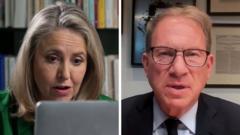Following a significant breach of sensitive information involving top US officials, journalist Jeffrey Goldberg recounts the fallout from his revelation and the attacks he's received from the Trump administration, questioning the ethical conduct of national security practices.
Inside the Chaos: Journalist Exposed to Trump's Secret Chat Group Defends His Scoop

Inside the Chaos: Journalist Exposed to Trump's Secret Chat Group Defends His Scoop
Jeffrey Goldberg, The Atlantic editor, discusses the backlash he's faced after revealing sensitive military details shared by Trump administration officials in a leaked Signal chat.
In a shocking turn of events, Jeffrey Goldberg, the editor of The Atlantic, has found himself at the center of a political storm after his report exposed a leak of sensitive information from a group chat that included some of the highest-ranking officials in the Trump administration. The chat, which was unwittingly shared with Goldberg via the Signal messaging app by National Security Advisor Michael Waltz, contained details regarding a military operation planned against Houthi rebels in Yemen.
Goldberg's scoop, highlighted in his Monday article, triggered harsh responses from the administration, with President Donald Trump and Waltz labeling him variously as a "loser" and "sleazebag." In a conversation with the BBC, Goldberg revealed how he received an unexpected message that led to an unexpected invitation into a chat where crucial military details were discussed without any apparent awareness of his presence.
Waltz has since admitted to mistakenly including Goldberg in the chat, creating a rift over whether Goldberg's reporting constituted a legitimate breach of national security. The editor has emphasized that the specific operational details shared within the chat, including timelines for military actions, were sensitive, despite pushback from administration figures who claimed there was nothing to see.
Goldberg has also faced personal attacks in the wake of his reporting. Reflecting on the hostile environment, he expressed confusion over the swift transition from being included in a significant conversation to being targeted for criticism. "I'm sitting there, minding my own business… now they're attacking me as a sleaze bag," he lamented, underscoring the aggressive tactics often employed in political discourse.
He also drew attention to a stark double standard regarding accountability within the administration, suggesting that lower-ranking officials would likely face severe repercussions for a similar breach of protocol. Despite the swirl of controversy, Goldberg chose to exit the Signal group, signaling a readiness to distance himself from the chaos created by the situation.
The implications of this incident highlight an ongoing concern regarding communication practices among national security personnel, alongside the ethical responsibilities of journalists navigating sensitive information. As the fallout continues, both sides are gearing up for what may lead to deeper investigations, with lawmakers from both parties eyeing the implications of this serious lapse in security protocol.
With the White House standing firm in its defense of the national security team, it remains to be seen how this incident will shape both public opinion and policy moving forward.





















